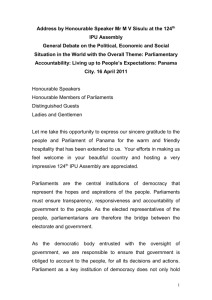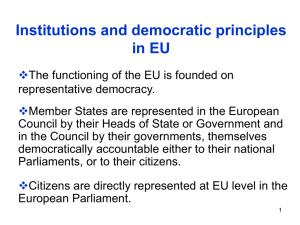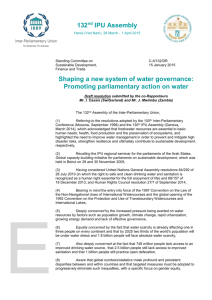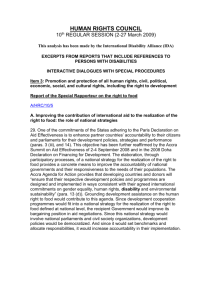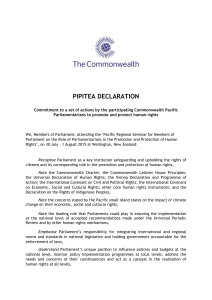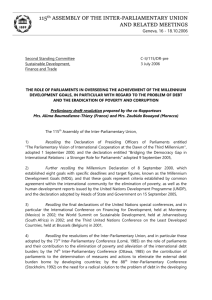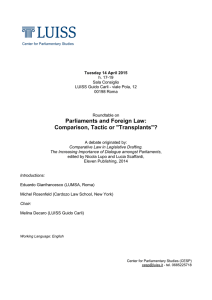INSTITUT FÜR EUROPÄISCHE VERFASSUNGSWISSENSCHAFTEN LINKING MULTIPLE DEMOI. INTER-PARLIAMENTARY RELATIONS
advertisement
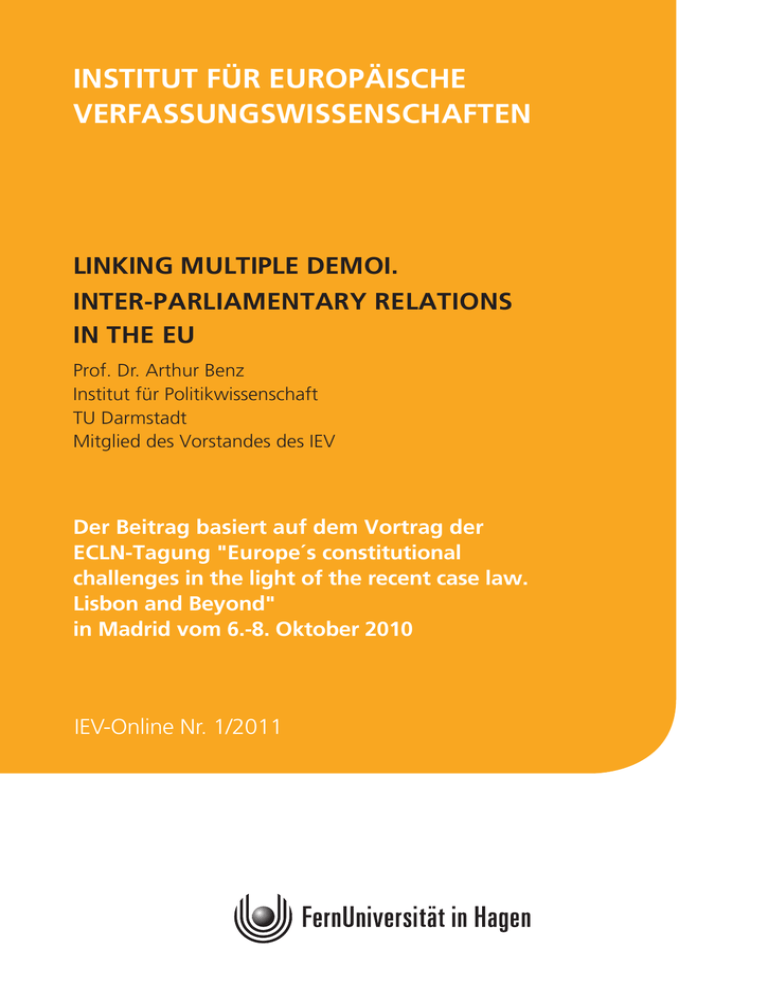
INSTITUT FÜR EUROPÄISCHE VERFASSUNGSWISSENSCHAFTEN LINKING MULTIPLE DEMOI. INTER-PARLIAMENTARY RELATIONS IN THE EU Prof. Dr. Arthur Benz Institut für Politikwissenschaft TU Darmstadt Mitglied des Vorstandes des IEV Der Beitrag basiert auf dem Vortrag der ECLN-Tagung "Europe´s constitutional challenges in the light of the recent case law. Lisbon and Beyond" in Madrid vom 6.-8. Oktober 2010 IEV-Online Nr. 1/2011 IEV-Online Hagener Online-Beiträge zu den Europäischen Verfassungswissenschaften ISSN: 1868-6680 FernUniversität in Hagen Institut für Europäische Verfassungswissenschaften 58084 Hagen Tel.: 02331 987-2912 e-mail: IEV@Fernuni-Hagen.de http://www.fernuni-hagen.de/iev Arthur Benz, Linking Multiple Demoi. Inter-parliamentary relations in the EU, IEV-Online 2011, Nr. 1 Linking Multiple Demoi. Inter-parliamentary relations in the EU Arthur Benz* I. Introduction For a long time, European integration has been said to come at the expense of national parliaments. Andrew Moravcsik’s conclusion that European integration had strengthened the executives of nation states 1 has found widespread agreement. Even as the powers of the European Parliament (EP) have been expanded to a significant degree, national parliaments have been regarded to be the losers during the integration process, similar to regional parliaments in federal states, which have seen inroads into their capacities to act effectively as intergovernmental relations have evolved. This “decline of parliaments” has been considered as the main cause of the democratic deficit of the EU. This portray of European democracy contrasts with normative ideas. The important role of member states in policy-making is one of the reasons why lower level parliaments, i.e. national and (where they exist) sub-national parliaments, have always been accorded a place in asserting the democratic legitimacy of EU policy-making. However, these normative claims have proved to raise complicated problems when put into practice. It was not until the mid 1990s that national parliaments have attracted attention in European politics. Indeed, as Simon Hix and Tapio Raunio observed ten years ago, parliaments have fought back. 2 They have responded to the encroachments of “executive federalism” à la Europe. However instead of fighting for veto power, as some experts have suggested, they have developed a broader set of instruments in order to assure a role for themselves. Meanwhile, the Treaty of Lisbon acknowledges parliaments of the member states as institutions contributing to democratic legitimacy in a multilevel polity. It is in particular the “early warning mechanism” of subsidiarity control which gives them power to influence the * 1 2 Arthur Benz is professor for political science at the Technische Universität Darmstadt, Germany. A. Moravcsik, Why the European Community Strengthens the State: Domestic Politics and International Institutions; Center for European Studies Working Paper Series 52, (Cambridge/Mass.: Center for European Studies, 1994). T. Raunio and S. Hix, “Backbenchers Learn to Fight Back: European Integration and Parliamentary Government”; West European Politics (2000) 23/4: 142-168. 1 Arthur Benz, Linking Multiple Demoi. Inter-parliamentary relations in the EU, IEV-Online 2011, Nr. 1 agenda of the EU. Still, it is an open question whether the new rules have more than a symbolic relevance. However, in order to understand the potential consequences of the Lisbon treaty on democratic legitimacy, we need to consider not only the direct effects on parliaments’ influence on agenda-setting but also the indirect effects on inter-parliamentary relations, which are triggered by the Lisbon treaty. These indirect effects contribute to reinforce horizontal instead of vertical relations in the European multilevel policy. In European studies, this dimension of the multilevel polity so far has been discussed as intergovernmental relations, with executives having been regarded as main actors. However, the EU reveals other patterns of horizontal relations, too, which still are underestimated. While scholars are interested in the evolution of a European party system 3 , they tend to ignore relations between national party leaders inside and outside the existing associations of national parties. Moreover, we know that private interest organisations became players in European politics 4 , by we have scant information about how national organisations cooperate across the borders of the member states. As regards courts, research has revealed the shifts of powers from national constitutional courts to the European Court of Justice 5 . Meanwhile there are indications that national and European courts constitute at least an informal network of communication that apparently has an impact on the evolution of law. Among these horizontal relations, those between national parliaments are of particular relevance. While explicitly making effective the mechanism of subsidiarity control, they implicitly can contribute to democratic legitimacy of EU legislation and policy-making in general. If we consider democracy in the EU as based on compound representation, horizontal relations on the multilevel setting turn out as significant in order to link the “multiple demoi”. For this reason, the Treaty of Lisbon has improved democracy in the EU not only by strengthening the EP, national parliaments and participatory democracy, but also by supporting inter-parliamentary relations. They have emerged since the 1990s but have got a significant thrust by the new Treaty. 3 4 5 E.g., S. Hix, A.G. Noury and G. Roland, Democratic Politics in the European Parliament (Cambridge: Cambridge University Press, 2007); Ph. Manow, A. Schäfer and H. Zorn „Europe’s party-political centre of gravity”; Journal of European Public Policy (2008) 15, 20-39. E.g., R. Eising, “Multilevel Governance and Business Interests in the European Union”; Governance (2004) 17, 211-245; R. Eising and B. Kohler-Koch, Interessenpolitik in Europa (Baden-Baden: Nomos, 2005). E. g., K. J. Alter „The European Court's Political Power”; West European Politics (1996) 19, 458-487; A. Stone Sweet, The Judicial Construction of Europe (Oxford: Oxford University Press, 2004); J. H. Weiler, The European Court of Justice: The Politics of Judicial Integration (Basingstoke: Palgrave Macmillan, 1998). 2 Arthur Benz, Linking Multiple Demoi. Inter-parliamentary relations in the EU, IEV-Online 2011, Nr. 1 II. Increasing powers of parliaments in the EU There is no doubt that the rise of the European Parliament has contributed to a more democratic European Union. The parliament incrementally has gained powers in EU politics either due to Treaty amendments or inter-institutional agreements with the Commission and the Council. According to the Lisbon Treaty, co-decision is now the standard procedure for enacting legislation, and the EP now participates on an equal footing with the Council of Ministers in many policy fields. The EP also successfully fought for supervision rights in comitology procedures and in the Open Method of Coordination, as well as for the right to participate in the selection of members of the Commission and to pass a vote of noconfidence against an incumbent Commission. Members of the EP are now included in negotiations on Treaty changes, although ratification of amendments remains the responsibility of the member states. For a long time, national parliaments seemed to be the losers of the integration process, or at least late-comers 6 . However, since the early stages of the European integration they have searched for effective ways to control the executive in European affairs and to hold their own national representative in the Council accountable. All member states introduced rules endorsing their parliament’s right to obtain comprehensive information on European issues from their governments as early as possible. Parliaments installed special Committees for European Affairs, determined to cope with the rising tide of issues and documents to be dealt with. Quite a number of national parliaments explicitly confirmed their veto power over their governments in European policies and put in place controls on the national representative in the form of binding mandates. Others systematically scrutinize European documents and the behaviour of their national representative in the Council. Their effective influence may vary between member states, 7 but no government can ignore the voice of its national parliament when negotiating at the European level. 6 7 A. Maurer and W. Wessels (eds.), National Parliaments on their Ways to Europe: Losers or Latecomers? (Baden-Baden: Nomos, 2001). Ph. Kijver, The National Parliaments in the European Union: A Critical View on EU Constitution-Building (The Hague: Kluwer, 2006); J. O'Brennan and T. Raunio (eds.), National Parliaments within the Enlarged European Union. From 'Victims' of Integration to Competitive Actors? (Abingdon: Routledge, 2007); T. Raunio, “National Parliaments and European Integration: What we know and what we should know”, ARENA – Center for European Studies, University of Oslo: ARENA Working Paper (online) 02/2009. http://www.arena.uio.no/publications/working-papers2009/papers/WP02_09.xml (accessed: 6 November 2010). 3 Arthur Benz, Linking Multiple Demoi. Inter-parliamentary relations in the EU, IEV-Online 2011, Nr. 1 Following these developments, the Treaty of Lisbon has introduced additional rules relating to national parliaments. They are not only acknowledged as institutions contributing to democratic legitimacy, they also have acquired rights to intervene in the definition of competences by the Commission, the Council or the EP, if they apply powers shared between the EU and the member states, and to participate in negotiations on amendments to the Treaties. As regards the application of powers in the EU, the Treaty on the European Union (TEU) stipulates that the Commission has to forward all initiatives for legislation directly to national parliaments. On this basis, parliaments can check whether an initiative conforms to the principle of subsidiarity. Otherwise, they can issue their opinion to the Commission. If parliaments with at least one third of their votes object to a legislative proposal, the Commission is obliged to reconsider the issue. If it pursues the proposal against a majority of parliamentary votes, it has to report to the Council and the EP, which both can reject the initiative by majority decision. In addition to this procedure which initiates political reasoning on the application of the subsidiarity principle, each national parliament can bring a legal act to the ECJ by claiming an infringement of this principle. National parliaments, together with the EP, also monitor and evaluate measures of the EU taken in the areas of security and law. These policies affect the core powers of nation states and concern the identity of national societies. For this reason, national parliaments are accorded particular influence. Moreover, they have a say when it comes to the application of flexibility clauses allowing the change of decision rules in the legislative process. Again such a change affects basic rights of a member state to defend its national interests. When Treaty amendments are on the EU agenda, representatives of national parliaments participate in a Convention which, according to the ordinary procedure, should be called for preparing Treaty amendments. Still the rule holds that amendments have to be ratified by all member states according to their constitutional provisions. This rule gives each national parliament a veto right. 8 8 The details of the ratification process are summarized in A. Benz, “Amendment Procedure and the Future Importance of the Convention”, in: I. Pernice and E. Tanchev (eds.), Ceci n'est pas une Constitution – Constitutionalisation without a Constitution? (Baden-Baden: Nomos, 2008), 190-202. 4 Arthur Benz, Linking Multiple Demoi. Inter-parliamentary relations in the EU, IEV-Online 2011, Nr. 1 The new rights of national parliaments add to their existing right to hold their national representative in the Council accountable according to rules set out in national law. What has changed with the Lisbon Treaty is that they are no longer limited to the role of “external veto players” 9 in European policy-making with no effective power to influence negotiations and the substance of decisions. Although they can in principle prevent their government to agree to a Council decision, in practices this kind of veto power is hardly effective. According to rules of parliamentary systems, parliaments can “tie the hands” of their government in negotiations in the Council, if they decide on a binding mandate. But such an intervention from outside risks to undermine the influence of the national government concerned. For this reason, including national parliaments in European policy-making marks a significant change of the democratic system. It goes without saying that national parliaments directly participate in European policymaking only in matters on subsidiarity and Treaty amendments. Their new powers aim at checking the integration process. But instead of participating as veto players, they now are expected to engage in discourses on whether policies should be made at the European level or not. Whether parliaments can effectively gain influence by these procedures is an open question. Among the other actors in European politics, they probably will remain in a weak position and the impact of the new mechanism will be modest. 10 However, the new Treaty rules have structural effects which may have more relevance than the rights allocated of national parliaments. They contribute to reinforce inter-parliamentary relations, in particular those between national parliaments of different member states. This horizontal structure is of particular significance in a multilevel representative democracy. III. The need for horizontal structures in representative democracy The Treaty amendments summarized in the preceding chapter assign different roles to national parliaments, part of them being shared with the EP. They formalized processes which have emerged during the previous decade. When Treaties are revised, representatives of national parliaments participate in negotiations on amendment proposals. As institutions parliaments maintained the right to veto an amendment in the ratification process. The 9 10 A. Benz “Path-dependent Institutions and Strategic Veto-Players – National Parliaments in the European Union”; West European Politics (2004) 29: 875-900 (880). Raunio (note 7): 14. 5 Arthur Benz, Linking Multiple Demoi. Inter-parliamentary relations in the EU, IEV-Online 2011, Nr. 1 mechanism of subsidiarity control allows them to influence deliberation of the Commission, the Council and the EP by issuing their opinion. The new right to be informed directly by European institutions makes them more independent from their executive which they should hold accountable. Thus the Lisbon Treaty mainly gave the national parliaments “soft” powers, in contrast to the “hard” powers which follow from their formal position in national parliamentary systems or are entrenched in constitutional or legal rules of the individual member states. It could be concluded that hard powers to veto a negotiation position of the national representative in the Council of Ministers or the ratification of Treaty amendments are more significant that soft powers. From this point of view, the Lisbon Treaty would have resulted more in symbolic that in effective changes. On the other hand, veto powers of national parliaments can be considered as rather weak since their application causes serious risks to block European legislation or to prevent the national executive to influence Council decisions. 11 To avoid this risk, parliaments usually support their government in European affairs. But if they just leave it to the government to define the national position, European policy-making and legislation would continue to be dominated by executives. Therefore, it is important to take into account the effects of the new soft powers of national parliaments on their ability to apply hard powers. Moreover, we should consider that the new rights to influence deliberations of European institutions are applied “in the shadow” of effective powers which national parliaments can exert against their governments or by taking legal action in the ECJ. From this point of view, “horizontal” inter-parliamentary relations induced by the participation of members of parliaments in Treaty negotiations and by the subsidiarity control procedure are of particular significance. They not only can lead to a more balanced allocation of powers between orders of the European polity, they also can contribute to increase democratic legitimacy. 12 By including parliaments in a mechanism designed to control the application of shared powers allocated to the EU, the Lisbon Treaty explicitly turns subsidiarity from a legal norm into a procedural rule. It also calls national parliaments to form coalitions in order to give more weight to their institutional interests. The more parliaments cooperate, the more they can accumulate countervailing forces against the transfer of powers to the European level. As 11 12 Benz (note 9): 880. B. Crum and J. E. Fossum “The Multilevel Parliamentary Field: A framework for theorising representative democracy in the EU”; European Political Science Review (2009) 1: 249-271. 6 Arthur Benz, Linking Multiple Demoi. Inter-parliamentary relations in the EU, IEV-Online 2011, Nr. 1 the new mechanism does not lead into a blockade of integration but in political deliberation on issued opinions, it is likely that a more problem-oriented, flexible balance of power is achieved in the federal order of the EU. Thus by avoiding an inbuilt trend towards either centralisation or blockade, the subsidiarity control implements an important precondition of a stable, “robust” 13 federal order. In addition, inter-parliamentary relations induced and supported by the early warning mechanism of subsidiarity control and by the new ordinary procedure to negotiate Treaty amendments can indirectly support the democratic quality of European governance. Its legitimacy is based on a particular structure of dual representation. 14 Given the multinational character of the European federation (which is not a federal state, but combines confederal and federal elements 15 ), legitimacy produced by the directly elected EP 16 still needs to be counterbalanced by legitimacy of governments responsible to their national parliaments. The need for this duality is hardly disputed. However, if democracy cannot be founded on the premise that there exists a single European demos but has to include multiple national demoi, particular structures which enable the representation of collectives have to be established. How they should look like can be explained if we consider the general prerequisites of democratic representation. It has to be emphasized, that democracy does not simply consist in the participation of citizens or parliaments in decisions or in veto power of parliaments or the voters. On the one hand it requires an institutional setting guaranteeing that representatives of citizens are empowered to make collective decisions in order to solve problems of societies. On the other, institutions should guide ruler to exert their power in a way which can be accepted by affected citizens as legitimate. This is the case if citizens apply their veto power in elections not in order to pursue their individual interests, but in order to induce governments to work for the public interest. To get a sense of what the public interest can be, governments have to 13 14 15 16 This concept of a “robust federation” is elaborated in J. Bednar, The Robust Federation: Principles of Design (New York: Cambridge University Press, 2009). It describes a federal system which allows flexible adjustments of the allocation of powers without causing instability. P. Graf Kielmansegg, „Integration und Demokratie“, in: M. Jachtenfuchs and B. Kohler-Koch (eds.), Europäische Integration (Opladen: Leske + Budrich, 2003), 49-83. S. Fabbrini, Compound Democracies. Why the United States and Europe are Becoming Similar (Oxford: Oxford University Press, 2010), 188. Still, elections to the EP reflect more national politics than voters’ responses to European policy-making, and therefore remain “second-order elections”; L. LeDuc, “European Elections and Democatic Accountability: the 2004 Elections to the European Parliament”, in: A. Hurrelmann and J. DeBardeleben (eds.), Democratic Dilemmas of Multilevel Governance (Basingstoke, New York: Palgrave Macmillan, 2007), 139-157. 7 Arthur Benz, Linking Multiple Demoi. Inter-parliamentary relations in the EU, IEV-Online 2011, Nr. 1 anticipate reactions of voters 17 , but at the same time voters have to consider not only their individual interests but also the interests of their fellow citizens. This is the reason why democracy cannot be reduced to voting procedures but requires public discussion in parliaments and in society. Therefore, the vertical relation between representatives and represented must be embedded in horizontal relations between those who are represented. In national democracies, this horizontal relationship is based on the mutual trust 18 and understanding among citizens in a national community which is supported by structures of communication provided by the media. Moreover, intermediary organisations like parties and associations constitute the horizontal structure of representative democracy. In the multilevel system of the EU, all these conditions cannot be taken for granted. Due to the weak social integration of European citizens who lack the bonds of mutual trust guaranteeing that their fellow citizens consider their interests when participating in political decisions, and due to the deficient opportunities of public communication, the EP cannot claim to speak and act alone for citizens of the EU. For this reason, EU democracy necessarily combines two structures of representation, with the direct representation of individual citizens in the EP being complemented by the indirect representation of citizens via their national parliaments. 19 However, if the latter only served as agents fighting for particular national public interests, decisions in the Council could only be justified if they conform to all national interest. The more the redistributive consequences of European integration come to the fore, the less likely is this unanimous agreement of European decisions. But if we cannot take it for granted that redistributive effects of policies are justified by some kind of solidarity among European citizens, majority decisions cannot be accepted as legitimate. Moreover, if national parliaments only stand for national interests, they tend to reject decisions of the Council, which may not only cause a problem of decision-making, but also of legitimacy. In the multilevel polity of the EU, national parliaments act as representatives of national communities of citizens, but by themselves they are also represented in the Council by their 17 18 19 C. J. Friedrich, Constitutional Government and Politics, Nature and Development (New York: Harper & Brothers, 1937), 16. C. Offe, „Demokratie und Wohlfahrtsstaat. Eine europäische Regimeform unter dem Streß der europäischen Integration“, in: W. Streeck (ed.), Internationale Wirtschaft, nationale Demokratie. Herausforderungen für die Demokratietheorie (Frankfurt a.M./New York: Campus, 1998), 99-136 (104-105). This structure has been labelled “compounded representation”; A. Benz, “Compounded Representation in EU Multi-Level Governance, in: B. Kohler-Koch (ed.), Linking EU and National Governance (Oxford: Oxford University Press, 2003), 82-110; J. B. Brzinski, T. D. Lancaster and C. Tuschhoff (eds.) Compounded Representation in West European Federations, Special Issue of West European Politics (London: Frank Cass, 1999). 8 Arthur Benz, Linking Multiple Demoi. Inter-parliamentary relations in the EU, IEV-Online 2011, Nr. 1 government. Certainly governments participating in European decision-making are accountable to their parliament, and this should be anticipated by their partners in negotiations. On the other hand, when scrutinizing their government, national parliaments conform to the normative requirements of democratic representation only if they consider national interests in the light of interests of other member states and with a concern for a common European public interest. That these “double-barrelled conditions” 20 are fulfilled can only be supposed if not only governments, but also parliaments develop horizontal structures that constitute an essential element in every form of democratic representation. And for this very reason, inter-parliamentary relations are an important element of European democracy. IV. Patterns of evolving inter-parliamentary relations The Treaty of Lisbon explicitly mentions horizontal relations among parliaments. Article 12 (f) TEU lays down that national parliaments should contribute to good governance of the Union by cooperating with the EP and with parliaments of other member states. Thus the Treaty not only has induced efforts to improve inter-parliamentary cooperation in the EU, it also establishes a normative principle for what so far had been practiced in an informal way. 21 Even before the Lisbon Treaty was ratified, national parliaments had established contacts with other parliaments. Nevertheless, inter-parliamentary relations had a strong bias towards the EP. Some national parliaments invited MEPs of their country to participate in their Committees of European affairs. Moreover, parliaments set up bureaus in Brussels in order to have access to European actors. Individual members of national parliaments, in particular those working in European Affairs Committees met, on a more or less regular basis, with members of the EP. Regular linkages between national parliaments of all member states exist since the COSAC was founded. Established as a forum determined to share information among European Affairs Committees, the Conference has evolved into a kind of service institution for national parliaments. Its current activities focus on developing coordination procedures designed to 20 21 D. Savage and A. Weale, “Political representation and the normative logic of two-level games”; European Political Science Review (2009) 1: 63-81 (75). K. Neunreither, “The European Parliament and National Parliaments: Conflict and Cooperation”, in: K. Auel and A. Benz (eds.), The Europeanisation of Parliamentary Democracy (London: Routledge, 2006), 164-187. 9 Arthur Benz, Linking Multiple Demoi. Inter-parliamentary relations in the EU, IEV-Online 2011, Nr. 1 make subsidiarity control effective. Responding to the Lisbon Treaty, the EP started similar efforts to bring parliaments together. It proposed the launch of a “legislative dialogue” with national parliaments, which should stimulate discussions on European policies in parallel with formal procedures. There are indications that members of national parliaments have extended contacts with their counterparts of other parliaments, mostly with those from neighbouring countries. For instance, the European Affairs Committee of the German Bundestag regularly invites or visits colleagues from other parliaments, and the exchange with the French Assemblee Nationale and the Polish Parliament is meanwhile well established. Nonetheless, when the Bundestag recently passed a resolution under the new subsidiarity control mechanisms and disputed that a proposed EU directive was necessary, neither the resolution nor one of the speakers in parliament referred to opinions expressed in other parliaments. 22 Still coordination between parliaments does not work. The subsidiarity protocol has intensified efforts to find proceedings, but it has not yet increased horizontal inter-parliamentary relations. So far it is difficult to evaluate the effects of the emerging patterns of “multilevel parliamentarism”. It may be true “that the current forms and levels of such cooperation are unlikely to change in the future”. 23 At the end, they may fulfil only a symbolic function. However, by establishing networks of communication, national parliaments can profit when fulfilling their new tasks. Inter-parliamentary relations can constitute platforms for coordinating decisions on matters of subsidiarity. On this basis, it is not unlikely that national parliaments use the opportunities to influence agenda-setting by the Commission. In the process of European legislation, they can profit from information on negotiation positions of member states that allow them to exert their power against their representative in the Council in a strategic way 24 and to escape looming dilemmas of multilevel policy-making. In particular, they should be able to adjust mandates to the twists and turns in negotiation processes and focus their scrutiny on essential issues. What remains a problem is that national parliaments have unequal capacities to fulfill their new role in inter-parliamentary relations. Comparative research on national parliaments in the 22 23 24 Plenary protocol of the German Bundestag (17th legislative period, 65th session 7 October 2010) http://www.bundestag.de/dokumente/protokolle/plenarprotokolle/17065.pdf, (accessed 5 November 2010), 6874-6882. Raunio (note 7): 13 Benz (note 9). 10 Arthur Benz, Linking Multiple Demoi. Inter-parliamentary relations in the EU, IEV-Online 2011, Nr. 1 EU has revealed clear variations in the institutionalisation of European issues in parliamentary work, in procedures of scrutinizing the executive, in organisational and procedural provisions to manage information, and in the degree of specialisation and engagement of members of parliaments. 25 For this reason, horizontal inter-parliamentary relations will not develop into a balanced multilateral interplay including parliaments of all member states on the same footing. Rather we have to expect that regional clusters of cooperation will form. Certainly, a disparity will prevail between a core of parliaments constituting a dense network and a periphery of weakly integrated parliaments. This inequality of opportunities to participate seems to violate a fundamental principle of democracy. However, as long as the horizontal structure of communication remains open to all parliaments, the minimum standard of political equality is met. Moreover, in systems of compounded representation, inequality at the inter-parliamentary level can be compensated by membership in European institutions. It goes without saying that prerequisites following from the normative concept of democratic representation and the reality of inter-parliamentary relations diverge. That the gap between norm and reality will shrink in the near future is all but certain. However, before constructing another democratic deficit, scholars working on the EU should address this issue in careful empirical research on the evolution of horizontal structures in the EU, in particular those linking national parliaments representing national communities of citizens. Only if we uncover patterns of communication and cooperation beyond intergovernmental relations of executives, we will be able to understand the strength and weaknesses of representative democracy in the EU. V. Conclusion Integration and democratic legitimacy in a compounded polity like the EU require crossborder relations of those represented on the upper level. As long as we cannot assume that European citizens develop a strong sense of community, horizontal trust and a certain degree of solidarity among their fellow citizens all across Europe, intermediary institutions and processes linking the national demoi are of particular relevance to make democracy work. If 25 K. Auel and A. Benz (eds.) The Europeanization of Parliamentary Democracy (London: Routledge, 2006), J. O’Brennan and T. Raunio (eds.), National Parliaments Within the Enlarged European Union: From 'Victims' of Integration to Competitive Actors? (London: Routledge Chapman & Hall, 2007), A. Maurer, Parlamentarische Demokratie in der Europäischen Union: Der Beitrag des Europäischen Parlaments und der nationalen Parlamente (Baden-Baden: Nomos, 2002). 11 Arthur Benz, Linking Multiple Demoi. Inter-parliamentary relations in the EU, IEV-Online 2011, Nr. 1 intended or not, the Treaty of Lisbon contributes to reinforce horizontal relations among national parliaments. If they continue to intensify their communicative relations, the balance of power between levels of the European federation and the legitimacy of Council decisions, can be improved. Moreover, parliaments can contribute to generate a European public space for discussing policies and link these discussions to the multilingual national public. The Lisbon Treaty reflects a complex conception of democracy. Needless to emphasise that elements of participatory democracy only add to representative democracy constituting the polity. Instead of creating a new model, the Treaty rather confirms the compounded nature of representation. In view of ongoing debates on European democracy, further theoretical and empirical research on this particular pattern of a multilevel democratic policy is necessary. As Ben Crum and John Eric Fossum rightly have argued, “the particular challenge involved in theorizing appropriate democratic standards for the EU lies not in the EU’s size, not even in its international or supranational character, but in the (horizontal and vertical) dispersion of democratic representation across multiple sites. This fact fundamentally challenges the traditional assumption that any given polity can be adequately represented by a single institution (i.e. parliament).” 26 The vertical division of democratic representation in the EP and national parliaments requires to “conceive of democratic representation as the result of the interplay of a multiplicity of processes that need to be assessed on the basis of their overall effect”. 27 However, the horizontal dimension of inter-parliamentary relations has to be included in the construction of an appropriate concept of compounded representation. 26 27 Crum and Fossum (note 12), 267. Crum and Fossum (note 12), 267. 12

